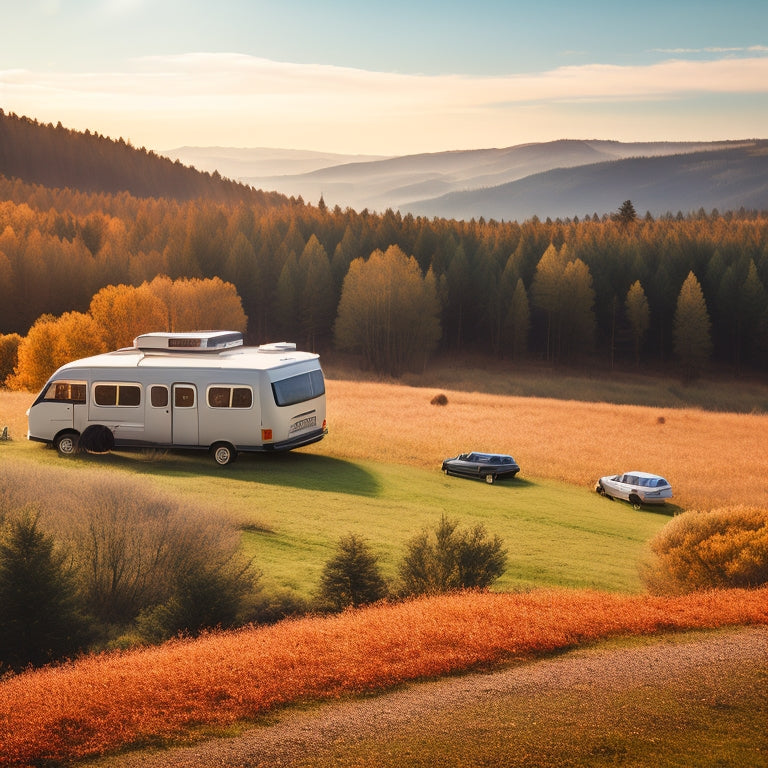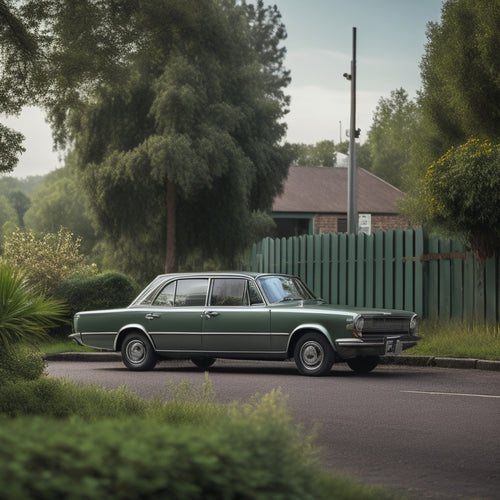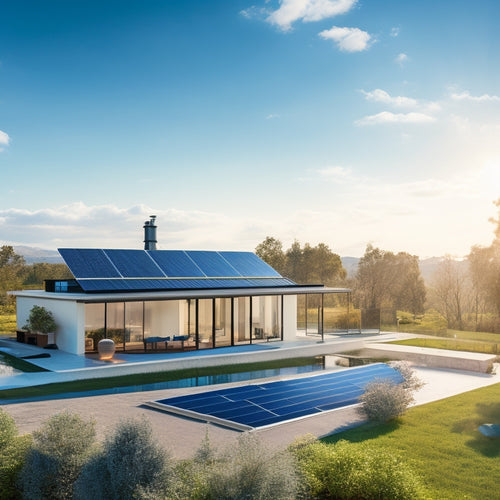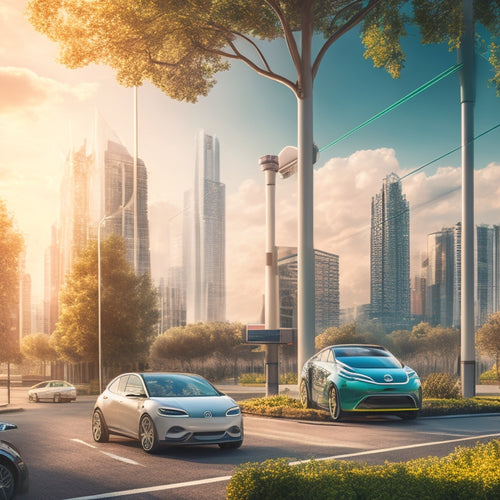
7 Best Solar Panel Options for Small Vehicles
Share
You're considering solar panels for your small vehicle, but where do you start? From cost considerations to mounting and installation costs, there are several factors to weigh. You'll need to balance panel size and power output with your vehicle's energy needs. Upgrading your battery and inverter can also greatly impact performance. High-efficiency panels, foldable and flexible options, and portable kits are all worth exploring. With so many options, prioritizing your needs is crucial. You're one step closer to finding the perfect system for your small vehicle, and taking the next step will reveal the best options for you.
Key Takeaways
• Consider cost factors, including financing options, operating expenses, and total cost of ownership, when choosing a solar panel system for small vehicles.
• Select solar panels that meet energy needs, balancing panel size and power output with vehicle power requirements and physical space constraints.
• High-efficiency solar panels with premium materials offer superior power output, improved durability, and longer lifespan for small vehicles.
• Foldable and portable solar panel kits provide convenient, reliable, and efficient energy solutions for off-grid adventures and small vehicles with limited rooftop space.
• Compact design features, such as foldable panels and compact charge controllers, enable faster charging and easy storage for small vehicles.
Cost of Small Vehicle Systems
Considering the costs and benefits before making a decision is crucial. Financing options are available to help you afford the system you need. You can explore loans or leasing options that fit your budget. However, don't forget to factor in operating expenses, such as maintenance and replacement costs, which can add up over time.
When calculating the total cost of ownership, consider the system's lifespan, energy output, and any potential incentives or tax credits. A high-quality system may cost more upfront, but it'll provide more power and last longer, reducing your operating expenses in the long run.
On the other hand, a cheaper system might require more frequent replacements, increasing your overall costs. By carefully considering your financing options and operating expenses, you can make an informed decision that suits your needs and budget.
Solar Panel Size and Power
When selecting a solar panel for your small vehicle, you'll need to take into account the panel's size and power output to make sure it meets your energy needs.
The size of the panel will impact the amount of energy it can generate, so it's crucial to balance panel size with the power requirements of your vehicle's systems.
Panel Size Considerations
Your solar panel's physical size and power output are critical factors that should be taken into account when selecting the right option for your small vehicle, as they directly impact the system's overall efficiency and charging capacity.
You'll want to contemplate the space available on your vehicle's roof or hood, as well as the aerodynamic profiles of different panels. A larger panel may provide more power, but it may also create wind resistance, decreasing your vehicle's fuel efficiency. On the other hand, a smaller panel may not provide enough power to meet your needs.
Space efficiency is key here - you'll want to find a panel that maximizes power output while minimizing its physical footprint. When evaluating different panels, be sure to check their power-to-size ratios to find the most efficient option for your vehicle.
Power Output Needs
To determine the ideal solar panel size and power output for your small vehicle, you need to calculate your energy requirements, considering the appliances and devices you plan to power and their respective energy consumption rates. This is where load calculations come in – think of it as doing your energy math homework.
You'll need to add up the energy demands of all your gadgets, from laptops to coffee makers, to determine your total energy needs.
Start by making a list of all the devices you want to power, along with their wattage ratings. Then, estimate how many hours a day you'll be using each device. Multiply the wattage by the hours used to get the total watt-hours (Wh) per day. Add up the Wh for all your devices to get your total daily energy demands.
This will give you a clear picture of how much power you need your solar panel to produce. Don't worry, it's not as complicated as it sounds – and it's worth the effort to make sure you get the right solar panel for your small vehicle.
Mounting and Installation Costs
Mounting and installation costs vary widely depending on the type of solar panel system you choose and the complexity of the installation process on your small vehicle. You'll need to take into account the cost of roof reinforcement, which can add up quickly, especially if you're dealing with a fragile or curved roof.
Additionally, wiring complexity can also drive up costs, so make sure you factor that in when planning your installation.
If you're opting for a more complex system, such as a tilt-mount or adjustable panel setup, you can expect to pay more for the added features. On the other hand, a simple peel-and-stick installation might be more budget-friendly.
Keep in mind that you may need to hire a professional for the job, which can add to the overall cost.
When getting quotes from installers, be sure to ask about any additional fees for things like electrical upgrades or custom mounting solutions. With a clear understanding of the costs involved, you can make an informed decision about which solar panel system is right for your small vehicle.
Battery and Inverter Upgrades
When upgrading your small vehicle's solar panel system, you'll likely need to pair it with a compatible battery and inverter setup to guarantee efficient energy storage and conversion.
A deep-cycle battery with a high amp-hour rating is ideal for storing excess energy generated by your solar panels. Look for batteries with built-in battery management systems (BMS) to ensure safe and efficient charging.
For the inverter, consider a pure sine wave model that can handle the surge capacity of your vehicle's electrical system. A high-efficiency inverter with a built-in charger will also enable Smart Charging, which optimizes energy harvesting and reduces energy waste.
When selecting an inverter, make sure it's compatible with your vehicle's electrical architecture to facilitate seamless Vehicle Integration. A well-matched battery and inverter combo will maximize your solar panel system's performance, providing reliable power on the go.
High-Efficiency Panel Options
When it comes to high-efficiency panel options, you're looking for top-tier performance that maximizes energy output. You'll want to focus on premium panel materials that boast impressive conversion rates, ensuring you get the most out of your solar setup.
High-Efficiency Performance
You can greatly enhance your small vehicle's energy independence with high-efficiency solar panels, which offer superior power output per unit area compared to standard models. These high-performance panels are designed to maximize energy harvesting, making them ideal for small vehicles with limited roof space.
To achieve high-efficiency performance, manufacturers employ advanced technologies such as cell optimization and thermal management. Cell optimization involves designing solar cells with larger surface areas, allowing them to capture more sunlight and generate more power.
Thermal management, on the other hand, guarantees that the panels operate within an ideal temperature range, preventing overheating that can reduce energy output. By combining these technologies, high-efficiency solar panels can achieve conversion rates of up to 23%, outperforming standard models.
With these high-performance panels, you can enjoy increased energy independence and reduced reliance on fossil fuels, making your small vehicle more eco-friendly and cost-effective.
Maximizing Energy Output
By selecting high-efficiency solar panels with advanced features, such as bifacial cells or multi-busbar designs, you can further maximize energy output and optimize your small vehicle's energy independence. These advanced features can increase energy production by up to 25%, making a significant difference in your vehicle's overall performance.
To take it to the next level, consider the following key factors to maximize energy output:
-
Angle optimization: Guarantee your solar panels are installed at the best angle to capture the most sunlight, taking into account your vehicle's movement and orientation.
-
Shading analysis: Identify potential shading areas on your vehicle's roof or surrounding environment to minimize energy losses.
-
Cleanliness: Regularly clean your solar panels to prevent dust and debris from reducing energy output.
- Monitoring: Keep track of your energy production and adjust your setup as needed to optimize performance.
Premium Panel Materials
High-efficiency solar panels made with premium materials can further boost energy production, building on the optimization strategies outlined above. You're likely wondering, what makes these premium materials so special? It all comes down to material durability and thermal resistance.
Premium materials like high-purity silicon and advanced glass coatings can greatly reduce thermal resistance, allowing your solar panels to perform at their best even in scorching temperatures. This means you'll get more power per hour of sunlight, which is especially important when you're on the move.
When it comes to material durability, premium solar panels are built to last. They can withstand harsh weather conditions, from torrential rains to blistering heatwaves. This translates to a longer lifespan for your solar panels, which means you'll get more bang for your buck.
And, let's be real, who doesn't want to minimize the environmental impact of their adventure? With premium solar panels, you can enjoy the freedom of the open road while keeping your carbon footprint in check. So, what're you waiting for? Upgrade to premium solar panels and take your energy production to the next level!
Foldable and Flexible Panels
Flexible solar panels designed for small vehicles can be folded and stored when not in use, making them a convenient option for those with limited rooftop space. These panels are perfect for off-grid adventures, providing a reliable source of power for your camping essentials.
When choosing a foldable solar panel, consider the following key features:
-
Portability: Look for panels with a compact design and carrying handle for easy transport.
-
Durability: Select panels with a rugged construction to withstand harsh outdoor conditions.
-
Efficiency: Opt for panels with high-efficiency solar cells to maximize energy output.
- Water resistance: Make sure the panel is waterproof or water-resistant to withstand rain or snow.
Portable Solar Panel Kits
You can utilize the power of the sun on-the-go with portable solar panel kits, designed to provide a convenient and reliable source of energy for your small vehicle's electrical needs. Whether you're venturing on off-grid adventures or simply need a reliable camping essential, these kits have got you covered. They're perfect for keeping your devices charged and your lights lit, even when you're far from the grid.
Here's a breakdown of what you can expect from a portable solar panel kit:
| Feature | Description | Benefits |
|---|---|---|
| Compact design | Foldable panels and compact charge controllers | Easy to store and transport |
| High-efficiency panels | Convert sunlight to energy with high efficiency | Faster charging times |
| Versatile charging options | USB, DC, and AC outlets for multiple devices | Charge multiple devices at once |
When choosing a portable solar panel kit, consider the size of your vehicle, your energy needs, and the type of devices you need to charge. With the right kit, you'll be well on your way to utilizing the power of the sun and staying connected on the go.
Frequently Asked Questions
Can I Install Solar Panels on a Vehicle With a Soft-Top Roof?
You're wondering if you can install solar panels on a vehicle with a soft-top roof? Yeah, it's doable, but you'll need roof reinforcement and clever fabric integration to guarantee a secure, watertight fit – no leaks or panel shifting allowed!
Do Solar Panels Affect the Vehicle's Aerodynamics and Fuel Efficiency?
You're wondering if slapping solar panels on your ride will turn it into a wind-resistant brick, right? Well, the answer is, yes, they do increase aerodynamic drag and wind resistance, but the impact is relatively small, and you can mitigate it with smart installation.
Can I Charge My Vehicle's Starter Battery With Solar Panels?
'You can charge your vehicle's starter battery with solar panels, but make sure the panel's output matches your battery's capacity. A 10-20W panel can trickle-charge a small starter system, but larger batteries need more power.'
How Do I Clean and Maintain My Vehicle's Solar Panels?
You're wise to prioritize maintenance! Regularly inspect your panels for debris, then gently remove dust with a soft brush or microfiber cloth to guarantee peak energy harvesting – a clean panel is a happy panel!
Will Solar Panels Drain My Vehicle's Battery When Not in Use?
"When not in use, solar panels won't drain your vehicle's battery, thanks to the Power Reserve feature, which kicks in an Idle Mode, ensuring energy conservation and peace of mind - you're all set!"
Related Posts
-

Why Regular Vehicle Panel Maintenance Matters Locally
You know that regular vehicle panel maintenance is essential to optimize your vehicle's performance, energy efficienc...
-

Why Opt for High-Efficiency Solar Panels Online?
You can greatly enhance your solar energy output and savings by upgrading to high-efficiency solar panels, which can ...
-

Designing Efficient Vehicle Charging Infrastructure Systems
As you design efficient vehicle charging infrastructure systems, prioritize strategic planning and optimization to av...


